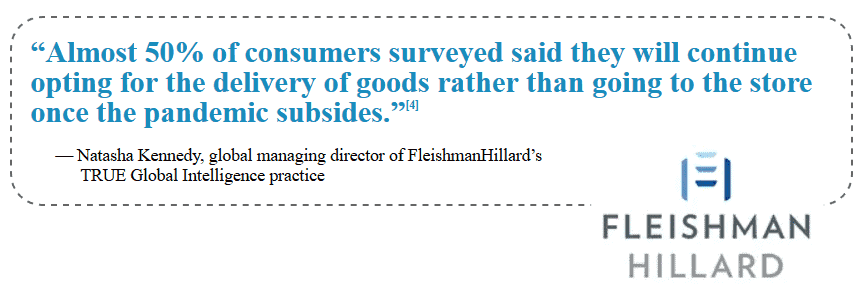
In early March, ‘normal’ life came to an end across the globe.
What was once the simple act of going to the grocery store has become an enormous time-intensive event. Protective masks, latex gloves, bottles of hand sanitizer, shoes for outside the house and even eye protection are the new norm.
Once we leave our home, we’re ‘social distancing’ by staying 6 feet away from people, and not touching our faces or any high-traffic surfaces.
I have to be honest here… most of the time, it just feels easier to stay inside.
And that is exactly what consumers are doing. Why go outside when you can order online?
Online retailers are seeing record-breaking sales. Amazon (NASDAQ: AMZN) CEO Jeff Bezos has witnessed his fortune grow by $24 billion (and that number only measures up to mid-April) during the coronavirus pandemic. That is about 20% higher than the previous four months.[1]
The coronavirus pandemic has pushed consumers to embrace e-commerce like never before. By the middle of March, two weeks after the COVID-19 pandemic really hit the US, online sales jumped 25% compared to the previous month.[2]

E-commerce was already growing before the outbreak, but since brick-and-mortar locations closed, consumers have been forced online for most or all of their purchases. In North America (United States and Canada), online sales surged 52% year-over-year for the two-week period of March 22 through April 4.[3]
Since the start of the coronavirus pandemic, it is survival of the fittest out there. Businesses must adapt to the changing landscape -- and only the strong will survive.
The automotive industry was, until two months ago, ruled by age-old business principles that took care of their own at the expense of the consumer. Buying a car online was a fantasy that only a few start-ups offered.
Elon Musk’s Tesla Inc. (NASDAQ: TSLA) has pushed their rebel business model in this instance. When they first announced direct sales of their cars to consumers, they faced legislative and litigative resistance to their business plan to sell products without utilizing a network of traditional third-party dealers like other auto manufacturers.[6]
Tesla prevailed and has had major success selling directly to customers. Up until now they have been the exception.

For the majority of interested car buyers, purchasing a vehicle involved physically going to the recognized manufacturer dealer or even the used car lot, talking to a salesperson face-to-face and haggling over the options and final price — an experience that often left consumers feeling exhausted and unsure if they got the best deal.
But due to the COVID-19 pandemic, the entire automotive sales industry was ultimately turned on its head starting in March 2020.
Dealerships in many states were deemed ‘non-essential’ and forced to close their showrooms, and in other states where social distancing orders were placed, dealerships could not meet health guidelines in such short order.
Automotive dealerships were scrambling to figure out a Plan B, i.e. online e-commerce, which most automotive dealerships have neglected to invest in — until now!
“For the majority of dealers, online sales were only a small percentage of total sales” before coronavirus hit, said Joern Buss, an auto industry consultant with the firm Oliver Wyman.
Most “are not set up to handle” a surge in online demand.[7]
There are a number of online start-ups that have been trying to break open the online auto sales market for years, with only modest success.
The coronavirus pandemic has immediately left the playing field wide open for alternative methods of buying cars, in order to prevent physically having to interact with a human who could be contagious, even if they are an asymptomatic carrier.
Today’s car-buying sites are easier to navigate than the majority of direct dealer sites operating today, due to years of customizing and perfecting the buyer experience. In addition, price comparison across platforms is simpler as well, in order to gain and build confidence with the consumer.
Most of the online sites include:
Many of the online options offer “touchless delivery” where the vehicle can be delivered to a customer’s home without ever interacting directly with a human.
For example, Carvana Co. (NYSE: CVNA) unloads the car at the buyer’s home, sanitizes the interior and leaves the paperwork for the customer to review and sign. The papers are picked up later at an agreed upon drop-off point and the transaction is completed without even a handshake.
“The health of our community at large is the highest priority during this time of uncertainty,” Ryan Keeton, Carvana co-founder and chief brand officer, wrote in an email to CNBC.[8]
While existing online auto sales sites are seizing the moment, traditional US dealerships are being left behind or are ultimately having to play catch up.
It does not take a psychic to see that North American auto sales are poised to go online. The industry was already crying for change and the COVID-19 pandemic was the nudge that pushed it over the edge.
Future auto sales will be done online at an increasing rate from here and into the future. Sure, there will always be showrooms to check out different models and options in person — but the actual full download purchase will more than likely be done online from a customer’s home where they can feel confident they are getting the best deal possible by comparing several choices from various websites.
I have done the research, there are two distinct segments in the future of online auto sales...
There are online services called automotive “marketplaces” where specific websites act as a bridge, connecting the selling dealerships to consumers. These services do not hold inventory and do not get involved in the actual transaction related to the selling price of their vehicle inventory.
Ultimately, the sale of the vehicle is between the dealership and the customer and goes back to how flexible the dealership is with making the sale without face-to-face human interaction.
Another type of auto sale website that follows the online dealership business model is often referred to as “direct sales,” which means vehicles are sold directly to consumers. Archaic state laws vary widely on how, if and when those sales can occur. I expect these state laws to change rapidly to accommodate our new social distance reality. And I foresee auto companies pulling out all the stops in an effort to increase sales and spur economic growth.
Let me point out, buying an automobile is the second most expensive purchase the average consumer will make next to buying a home. So, it is important that every state enact some level of guidance for consumers moving forward.
Just to give you further evidence this trend in online car sales is hot and could get even hotter, take a look at Vroom Inc. They just announced their intention to IPO in June — in the middle of a pandemic and one of the worst economic downturns since the great depression![9]
Below are my favorites for each segment.
CarGurus, Inc. (NASDAQ: CARG)
CarGurus was founded in 2006 by Langley Steinert, co-founder of TripAdvisor. CarGurus is a global, online automotive marketplace connecting buyers and sellers of new and used cars. The company uses proprietary technology, search algorithms and data analytics to bring trust and transparency to the automotive search experience and help shoppers find great deals from top-rated dealers.
In addition to the United States, CarGurus operates online marketplaces in Canada, the United Kingdom, Germany, Italy and Spain.
Cars.com Inc. (NYSE: CARS)
Cars.com is a digital marketplace for the automotive industry that connects car shoppers with sellers. Launched in 1998 and headquartered in Chicago, the company empowers shoppers with the data, resources and digital tools needed to make informed buying decisions and seamlessly connect with automotive retailers.
In a rapidly changing market, Cars.com enables dealerships and OEMs with innovative technical solutions and data-driven intelligence to better reach and influence ready-to-buy shoppers, increase inventory turn and gain market share.
TrueCar, Inc. (NASDAQ: TRUE)
TrueCar, Inc. is an automotive digital marketplace that enables car buyers to connect to a nationwide network of Certified Dealers. Consumers who visit the marketplace will find a suite of vehicle discovery tools, price ratings and market context on new and used cars. When they are ready to buy, TrueCar connects them with a local Certified Dealer.
TrueCar works with over 250 leading brands including AARP, Sam’s Club, and American Express. Nearly half of all new-car buyers engage with TrueCar powered sites. TrueCar is headquartered in Santa Monica, California, with regional offices in Austin, Texas and Boston, Massachusetts.
RumbleOn, Inc. (NASDAQ: RMBL)
A junior entry amongst the crowd, RumbleOn is an e-commerce company that uses innovative technology to simplify how dealers and customers buy, sell, trade, or finance pre-owned vehicles through RumbleOn’s 100% online marketplace.
Leveraging its capital-light network of 17 regional partnerships and innovative technological solutions, RumbleOn is disrupting the old-school pre-owned vehicle supply chain by providing users with the most efficient, timely and transparent transaction experience.
WATCH VIDEO: RumbleOn is a publicly-traded technology company that has created a simple digital platform to buy, sell, trade, and finance any vehicle, 100% online, via the web or mobile devices.
I have been following this company for the past year and a half, and I like their business model. The company’s share price has cratered in the last year but is now seeing some life as the vast majority of auto sales move online. This could be their moment to shine.
I am adding this to the list as a dark horse candidate. It could surprise in the ‘new normal’ landscape.
Carvana Co. (NYSE: CVNA)
Carvana is an e-commerce platform for buying and selling used cars. As consumers increasingly demand an online retail environment, they are reshaping what is becoming a new normal. They have been quick to react to how shopping preferences have changed, and have raised $600 million from investors in support of continued innovation and growth.
As the pioneer of online car buying, Carvana made every step of the process self-serve, easy and transparent: more than 25,000 vehicles to shop for from home, no-haggle pricing, financing decisions in minutes, detailed 360-degree virtual vehicle tours and a 7-day return policy.
At a time when many businesses are pivoting to online sales, Carvana is leading the way, executing on seven years of growth.
Forbes recently featured an article on the father-son duo behind the 8-year old firm. During one of the worst months for car sales on record, Carvana’s stock soared over 30%.[10]
[custom_player id=FnHaPVP-opw]
WATCH VIDEO: Carvana's fully-automated, coin-operated car vending machine
CarMax, Inc. (NYSE: KMX)
CarMax, the nation’s largest retailer of used cars, revolutionized the automotive retail industry by driving integrity, honesty and transparency in every interaction. CarMax continues to innovate and is currently rolling out an omni-channel experience, providing customers the option to complete transactions entirely from home, in store, or via a seamless combination of both.
CarMax has more than 200 stores nationwide, and during the latest fiscal year sold nearly 750,000 used cars and 450,000 wholesale vehicles at its in-store auctions. With more than 25,000 associates, CarMax is proud to have been recognized for 15 consecutive years as one of the Fortune 100 Best Companies to Work For.®
Tesla, Inc. (NASDAQ: TSLA)
Tesla, Inc. designs, develops, manufactures, leases, and sells electric vehicles, as well as energy generation and storage systems internationally. The company operates in two segments: automotive, and energy generation & storage.
The automotive segment offers sedans and sport utility vehicles. It also provides electric powertrain components and systems; and services electric vehicles through its company-owned service locations, and Tesla mobile service technicians, as well as sells used vehicles. This segment markets and sells its products through a network of company-owned stores and galleries, as well as through its own website.
Elon Musk is a genius and has made his mark in so many industries. You can love or hate the guy, but he is a rebel and has proven his ideas work — more than once. Investing in Tesla provides you with both the auto sales angle as well as the green energy angle.
The coronavirus COVID-19 pandemic has changed the rules of how customers and automotive business owners interact to make a sale. The auto sales industry is in the midst of a watershed moment.
The idea of shunning e-commerce in favor of old-school face-to-face sales tactics is now dead. Those who adapt will survive to see another day. The “new normal” has already arrived, whether we like it or not, for the foreseeable future.
Smart investors will come to realize this could be an opportunity of historic proportions in the automotive sector. The markets have taken a beating in the last few months, but I believe this is a time of readjusting your mindset to new ways of living and not the end of our economy. It is about discovering new opportunities among companies that are the new digital superstars no matter what sector.

Change is always hard to swallow in the beginning, but in the end, I have always found that change, and in this case, the accelerated change born by the coronavirus to adapt to an online world, could arguably end up better for consumers in the long run.
Think about it… as investors, we are always on the hunt for companies ahead of the curve, that provide forward thinking solutions, innovative ways of operating their businesses, and are well-positioned for the future. This is why we are investors!
I believe the auto sales industry is waking up, and has no other choice but to move most or all of their business online, being one of the market sectors that would ultimately benefit from the currently changing landscape.
Investors that have the foresight and risk profile to see where we are headed far beyond COVID-19 could reap the biggest rewards long term!
I'm betting on the accelerated future, where everyone will further support and ultimately end up online. This includes consumers across multiple industries, forming what may be the “new normal.” It's pretty easy to understand the attraction to supporting smart online business models.
Within this article, I have only provided a window into how things are rapidly changing and how the evolution and switch to the digital world will play an enormous part in our future lives moving forward.
Invest wisely, and always do your own due diligence.

MF Williams, Contributor
for Investors News Service
P.S. To discover more opportunities in the hottest sectors in North America, sign up now to the Financial News Now newsletter to get the latest updates and investment ideas directly in your inbox!
DISCLAIMER: Investing in any securities is highly speculative. Please be sure to always do your own due diligence before making any investment decisions. Read our full disclaimer here.
HEADLINE VALUATION: Total market value of US$630 trillion was derived from taking the total number of reported (1) average 40 million used cars transacted and (2) 17,023,894 new cars sold within calendar year 2019 and multiplying that by the average price of a vehicle transaction on a national scale. https://www.statista.com/statistics/274927/new-vehicle-average-selling-price-in-the-united-states/, https://www.goodcarbadcar.net/usa-auto-industry-total-sales-figures/
[1] https://www.theguardian.com/technology/2020/apr/15/amazon-jeff-bezos-gains-24bn-coronavirus-pandemic
[2] https://www.bloomberg.com/news/articles/2020-03-31/americans-adopting-e-commerce-faster-than-ever-amid-pandemic
[3] https://www.digitalcommerce360.com/article/coronavirus-impact-online-retail/
[4] https://www.latimes.com/business/newsletter/2020-04-13/coronavirus-consumer-behavior-business
[5] https://home.kpmg/uk/en/home/media/press-releases/2018/01/car-buying-will-shift-to-online-finds-kpmg-survey.html
[6] https://www.ftc.gov/news-events/blogs/competition-matters/2015/05/direct-consumer-auto-sales-its-not-just-about-tesla
[7] https://www.latimes.com/business/story/2020-04-08/buying-car-online-dealers-coronavirus
[8] https://www.cnbc.com/2020/04/09/coronavirus-pushes-auto-dealers-to-embrace-online-sales-like-tesla.html
[9] https://www.marketwatch.com/story/online-used-car-seller-vroom-seeks-june-ipo-in-confidential-filing-2020-05-10
[10] https://www.forbes.com/sites/jonathanponciano/2020/05/08/billionaires-amazon-of-cars-carvana/#9637c9d1bf86